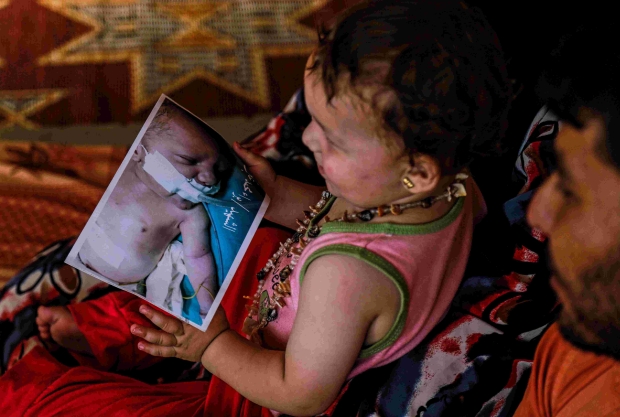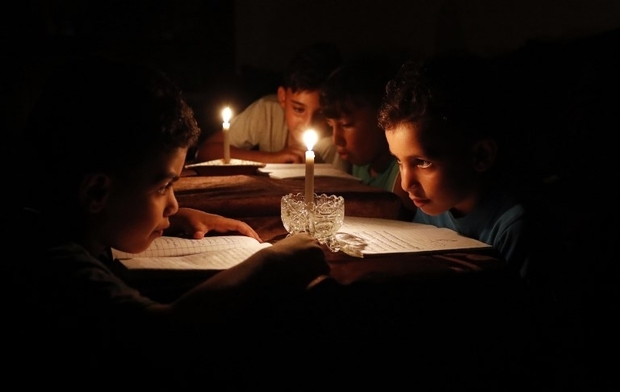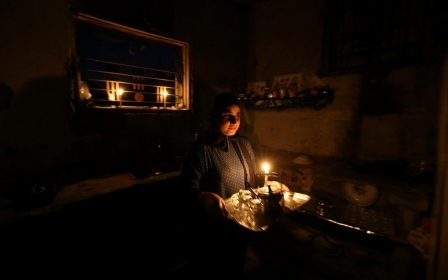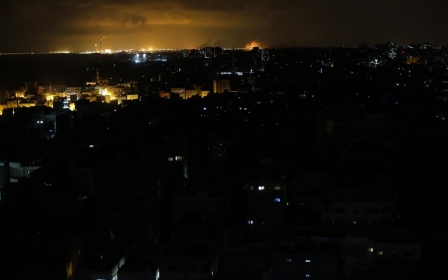'I am afraid of losing my child': Gaza babies die amid political row

GAZA STRIP - Baraa Ghaben was eight days old when he died.
He was one of four Palestinian newborns to perish in the space of 24 hours. Each had been refused a therapeutic transfer – which would have allowed them to leave Gaza for medical treatment - by the Palestinian Authority (PA) and the Israeli authorities.
"I was terrified when the doctor told me that my son had heart defects and needed an immediate therapeutic transfer," his father Mohammed told Middle East Eye. "I was afraid because I knew that I could not easily get a therapeutic transfer. But I told myself, he is a little baby, he will not be banned.”
Then he read about the death of Musa'ab al-Areer, another Palestinian newborn who was also refused a transfer and had just died.
"I wondered if my baby would be next,” said Mohammed. "The next morning, the hospital administration called to tell me that my son died. I was speechless."
Baraa Ghaben passed away 10 hours after Musa'ab al-Areer. His mother, Hanan, said she collapsed on hearing about the death of her son.
"I dreamt of seeing my daughter Maryam playing with her brother Baraa before his death. Now she is holding his picture and kissing it. She does not know what happened.”
'I accuse the Palestinian Authority of his death'
The death of Musa'ab al-Areer, the first baby to die during 2017 due to the transfer blockade, shocked Gazans and attracted widespread publicity.
To many, an innocent child had died because of political conflicts, a victim of the antagonism between Fatah and Hamas as well as the Israeli siege in operation for 11 years.
Translation: Baby Musa'ab El-Areer died as he was waiting for his medical transfer. At the same time a cat was allowed to leave Gaza. Yeah, it’s true a cat has a life, but so does a child.
The Gaza-based Treatment Abroad Department, which administers the transfers, was established in 1994 under the supervision of the PA Ministry of Health in the West Bank.
But the PA has cut the annual financial allocation for transfers since Fatah, which controls the authority, split with Gaza's ruling group Hamas in 2006. The number of transfers has informally dwindled still further since late May, according to the ministry of health in Gaza, with approvals for only 220 applications out of more than 3,500.
As a result, the health ministry in Gaza reported last month that 13 patients had died during 2017. Currently there are an estimated 4,000 medical cases awaiting transfers.
'What has he done wrong to be a victim of the Israeli siege and the Palestinian division?'
- Nadia, grandmother
Musa'ab’s grandmother Nadia said that his condition – he was born with his heart outside his thoracic cage and his umbilical cord adjacent to the heart – was too complicated for hospitals in Gaza to treat.
She told MEE that the family tried to send her first grandson to Makassed Hospital in Jerusalem and Hebron Hospital before Tel HaShomer in Ramat Gan accepted, but it was too late.
"Since his first breath, we did our best to send him abroad, but the Palestinian Authority in Ramallah put obstacles in the way of travel procedures. They refused to give us the permission," she said.
"What has he done wrong to be a victim of the Israeli siege and the Palestinian division? I accuse the Palestinian Authority of his death."
Doctor: 20 cancer treatments unavailable
At the Rantisi Children's Hospital in Gaza, Samir al-Zain sits next to his son Baraa, eight, who has had cancer of the blood for 18 months.
Samir says that his son had attended Israeli hospitals for treatment and that he was progressing until the situation became complicated in recent months.
"Every day my wife and I go to sit next to our child in the hospital. We wait for someone to tell us that the occupation has agreed to our child's travel for treatment. But it seems that the siege will kill our children.”
Awad Aishan, a consultant oncologist at the hospital, told MEE that patients were falling victim not only to the blockade on transfers but also power cuts which damaged medicines and vaccinations.
"We are exerting double the effort in treating children and the elderly who suffer from chronic diseases,” he said. “But the problem is the lack of treatment for difficult [cases], which require urgent treatment abroad.”
'It seems that the siege will kill our children'
- Samir al-Zain, father
Aishan said that there were about 20 types of treatments for cancer patients which were now unavailable in Gaza.
"Patients in the hospital are suffering because of the lack of treatment and need therapeutic transfers urgently.”
In April, Khalil al-Durgan, the head of nursing in Gaza, said the power cuts had the potential to impact 113 baby incubators, 117 dialysis devices which service 620 patients' lives and 51 operating theatres.
The ministry has also reported that 50 medical laboratories and 10 blood banks have also been impacted by the outages, which are exacerbated by a shortage of diesel to operate generators.
'I am afraid of losing my child'
Ashraf al-Qedra, a spokesperson for the Palestinian Ministry of Health in Gaza, told Middle East Eye "that the ministry in Ramallah did not respond to the requests for therapeutic transfers, and did not get permission to travel, which led to the deaths of the four children".
He said that the number of transfers had dwindled. "The Palestinian Authority responded by rejecting 1,622 medical treatment transfers for Gaza patients, and other transfers were not answered, either by approval or refusal.
The Palestinian Authority said in June that it had not altered its policy for Gaza, Haaretz reported, and that there had been no change in the number of financial grants.
Israel has blockaded Gaza since Hamas took control in 2006. It says that the request to tighten the blockade and cut power came from the PA, which Israel says is the official and legitimate government of all Palestinians.
In May, the Gaza Association of Human Rights Organisations condemned the PA and Israel and demanded that they abide by their obligations to civilians in the territory, including the most basic rights. It also called on Hamas and Fatah leaders to end the division.
Back at Rantisi Children's Hospital, Maryam Abu Hasira sits with her son Yazen, six, who has muscle cancer. She says that her son had been treated in Israel, paid for by the Palestinian Authority, until it suddenly stopped four months ago.
“We do not know why,” she says, “and the occupation uses the term ‘security’ as an excuse to prevent us from travelling.
"I am afraid of losing my child. I do not imagine him dying in front of my eyes, while I am motionless. I do not want him to die like other children.”
This article is available in French on Middle East Eye French edition.
Middle East Eye propose une couverture et une analyse indépendantes et incomparables du Moyen-Orient, de l’Afrique du Nord et d’autres régions du monde. Pour en savoir plus sur la reprise de ce contenu et les frais qui s’appliquent, veuillez remplir ce formulaire [en anglais]. Pour en savoir plus sur MEE, cliquez ici [en anglais].







